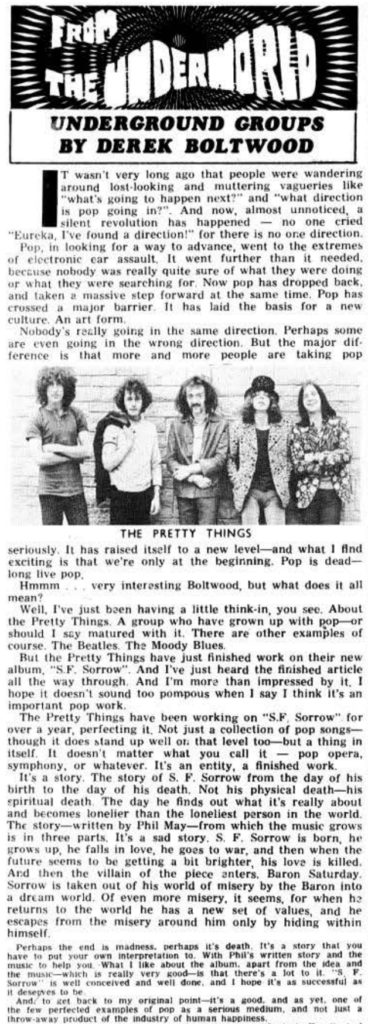Cet article de Derek Boltwood est paru dans le numéro 399 de l’hebdomadaire britannique Record Mirror, daté du 2 novembre 1968. Il s’agit en fait d’une colonne récurrente dans laquelle Boltwood présente chaque semaine des artistes débutants, ou un peu oubliés, ou un peu différents des idoles pop du moment ; en tout cas, des artistes qui appartiennent à cet univers diffus qu’est the underworld, le monde du dessous – on pourrait dire underground.
Fin 1968, les Pretty Things appartiennent définitivement à cette catégorie : ils sont loin, les jours où ils trustaient le sommet du hit-parade. Ils viennent de finir leur magnum opus, S. F. Sorrow, et Boltwood, qui a l’occasion d’écouter l’album en avant-première, adore. Il espère qu’il connaîtra le succès… espoirs déçus, bien entendu.

Transcription
It wasn’t very long ago that people were wandering around lost-looklng and muttering vagueries like “what’s going to happen next?” and “what direction is pop going in?” And now, almost unnoticed, a silent revolution has happened—no one cried “Eureka, I’ve found a direction!” for there is no one direction.
Pop, in looking for a way to advance, went to the extremes of electronic ear assault. It went further than it needed, because nobody was really quite sure of what they were doing or what they were searching for. Now pop has dropped back, and taken a massive step forward at the same time. Pop has crossed a major barrier. It has laid the basis for a new culture. An art form.
Nobody’s really going in the same direction. Perhaps some are even going in the wrong direction. But the major difference is that more and more people are taking pop seriously. It has raised itself to a new level—and what I find exciting is that we’re only at the beginning. Pop is dead—long live pop.
Hmmm . . . very interesting Boltwood, but what does it all mean?
Well, I’ve just been having a little think-in, you see. About the Pretty Things. A group who have grown up with pop—or should I say matured with it. There are other examples of course. The Beatles. The Moody Blues.
But the Pretty Things have just finished work on their new album, “S.F. Sorrow.” And I’ve just heard the finished article all the way through. And I’m more than impressed by it. I hope it doesn’t sound too pompous when I say I think it’s an important pop work.
The Pretty Things have been working on “S.F. Sorrow” for over a year, perfecting it. Not just a collection of pop songs—though it does stand up well on that level too—but a thing in itself. It doesn’t matter what you call it—pop opera, symphony, or whatever. It’s an entity, a finished work.
It’s a story. The story of S. F. Sorrow from the day of his birth to the day of his death. Not his physical death—his spiritual death. The day he finds out what it’s really about and becomes lonelier than the loneliest person in the world. The story—written by Phil May—from which the music grows is in three parts. It’s a sad story. S. F. Sorrow is born, he grows up, he falls in love, he goes to war, and then when the future seems to be getting a bit brighter, his love is killed. And then the villain of the piece enters. Baron Saturday. Sorrow is taken out of his world of misery by the Baron into a dream world. Of even more misery, it seems, for when he returns to the world he has a new set of values, and he escapes from the misery around him only by hiding within himself.
Perhaps the end is madness, perhaps it’s death. It’s a story that you have to put your own interpretation to. With Phil’s written story and the music to help you. What I like about the album, apart from the idea and the music—which is really very good—is that there’s a lot to it. “S. F. Sorrow” is well conceived and well done, and I hope it’s as successful as it deserves to be.
And, to get back to my original point—it’s a good, and as yet, one of the few perfected examples of pop as a serious medium, and not just a throw-away product of the industry of human happiness.
Source : WorldRadioHistory.com (PDF).